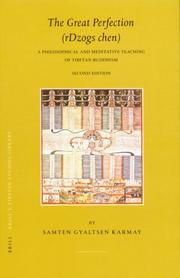| Listing 1 - 3 of 3 |
Sort by
|

ISBN: 1281926027 9786611926021 9047419782 9789047419785 9789004151420 9004151427 9781281926029 661192602X Year: 2007 Volume: 11 Publisher: Leiden Boston Brill
Abstract | Keywords | Export | Availability | Bookmark
 Loading...
Loading...Choose an application
- Reference Manager
- EndNote
- RefWorks (Direct export to RefWorks)
The Great Perfection (rDzogs chen in Tibetan) is a philosophical and meditative teaching. Its inception is attributed to Vairocana, one of the first seven Tibetan Buddhist monks ordained at Samye in the eight century A.D. The doctrine is regarded among Buddhists as the core of the teachings adhered to by the Nyingmapa school whilst similarly it is held to be the fundamental teaching among the Bonpos, the non-Buddhist school in Tibet. After a historical introduction to Tibetan Buddhism and the Bon, the author deals with the legends of Vairocana (Part I), analysing early documents containing essential elements of the doctrine and comparing them with the Ch'an tradition. He goes on to explore in detail the development of the doctrine in the tenth and eleventh centuries A.D. (Part II). The Tantric doctrines that play an important role are dealt with, as are the rDzogs chen theories in relation to the other major Buddhist doctrines. Different trends in the rDzogs chen tradition are described in Part III. The author has drawn his sources mainly from early unpublished documents which throw light on the origins and development, at the same time also using a variety of sources which enabled him to explicate the crucial position which the doctrine occupies in Tibetan religions.
Rdzogs-chen --- Rdzogs-chen. --- Rdzogs-chen (Bonpo) --- Spiritual life --- Atiyoga --- Dzogchen --- Dzogschen --- Rdsogs-chen --- Rdzogs-chen (Rñiṅ-ma-pa) --- Rdzogs-pa-chen-pa --- Bon (Tibetan religion) --- Rnying-ma-pa (Sect) --- Buddhism --- Rdzogs-chen - Bon (Tibetan religion)
Book
ISBN: 9780231556187 Year: 2023 Publisher: New York : Columbia University Press,
Abstract | Keywords | Export | Availability | Bookmark
 Loading...
Loading...Choose an application
- Reference Manager
- EndNote
- RefWorks (Direct export to RefWorks)
Ritual manuals are among the most common and most personal forms of Buddhist literature. Since at least the late fifth century, individual practitioners—including monks, nuns, teachers, disciples, and laypeople—have kept texts describing how to perform the daily rites. These manuals represent an intimate counterpart to the canonical sutras and the tantras, speaking to the lived experience of Buddhist practice.Conjuring the Buddha offers a history of early tantric Buddhist ritual through the lens of the Tibetan manuscripts discovered near Dunhuang on the ancient Silk Road. Jacob P. Dalton argues that the spread of ritual manuals offered Buddhists an extracanonical literary form through which to engage with their tradition in new and locally specific ways. He suggests that ritual manuals were the literary precursors to the tantras, crucial to the emergence of esoteric Buddhism. Examining a series of ninth- and tenth-century tantric manuals from Dunhuang, Dalton uncovers lost moments in the development of rituals such as consecration, possession, sexual yoga, the Great Perfection, and the subtle body practices of the winds and channels. He also traces the use of poetic language in ritual manuals, showing how at pivotal moments, metaphor, simile, rhythm, and rhyme were deployed to evoke carefully sculpted affective experiences. Offering an unprecedented glimpse into the personal practice of early tantric Buddhists, Conjuring the Buddha provides new insight into the origins and development of the tantric tradition.
Tantric Buddhism --- RELIGION / Buddhism / Tibetan. --- History. --- Rituals --- Dunhuang. --- Dzogchen. --- Tibetan Buddhism. --- consecration. --- esoteric Buddhism. --- possession. --- religious studies. --- rites and rituals. --- ritual manuals. --- sexual yoga. --- tantra. --- the Great Perfection. --- Buddhism, Tantric --- Buddhist tantrism --- Esoteric Buddhism --- Mantrayāna Buddhism --- Mikkyō --- Tantrism, Buddhist --- Vajrayāna Buddhism --- Buddhism --- Mahayana Buddhism
Book
ISBN: 900453637X 9004534229 Year: 2023 Publisher: BRILL
Abstract | Keywords | Export | Availability | Bookmark
 Loading...
Loading...Choose an application
- Reference Manager
- EndNote
- RefWorks (Direct export to RefWorks)
"The notion of effortlessness is central to the self-understanding of the Tibetan contemplative tradition known as Dzogchen. This book explores this key notion from a variety of perspectives, highlighting the distinctive role it plays in the Dzogchen approach's doctrinal architecture and meditative programme. The book's focus is on the early development of the Dzogchen tradition, especially as codified in a set of hitherto unstudied commentaries by the 10th-century scholar and meditation master Nubchen Sangye Yeshe. A full annotated translation of the commentaries is provided, along with an edition of the Tibetan texts on facing pages"--
Rnying-ma-pa (Sect) --- Rdzogs-chen. --- Doctrines. --- Sangs-rgyas-ye-shes, --- Atiyoga --- Dzogchen --- Dzogschen --- Rdsogs-chen --- Rdzogs-chen --- Rdzogs-chen (Rñiṅ-ma-pa) --- Rdzogs-pa-chen-pa --- Spiritual life --- Buddhism --- Saṅs-rgyas-ye-śes, --- Gnubs-chen Saṅs-rgyas-ye-śes --- Nubchen Sangye Yeshe --- Sangye Yeshe, Nubchen --- Yeshe, Nubchen Sangye
| Listing 1 - 3 of 3 |
Sort by
|

 Search
Search Feedback
Feedback About UniCat
About UniCat  Help
Help News
News